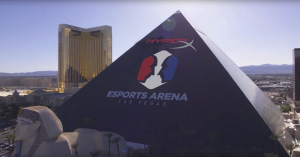The growth of esports betting globally through 2020 has been discussed at length. Its potential in the U.S. market alone is vast, but it’s certainly been more of an uphill challenge given the legality of sports betting state to state.
Despite these hurdles, esports betting in the U.S. has still developed considerably in recent times, not least in Nevada and New Jersey. The former’s casino, or entertainment venues, offering has naturally played a major role in that.
Indeed these venues have looked at esports from not only a betting perspective, but very much as a whole new set of events and consumers that the ‘entertainment capital of the world’ could service and accommodate.

RELATED: GameCo debuts esports betting solution tailored for U.S. market
Spotting a potential opportunity
Over the last few years, casinos have looked to embrace esports whilst also optimising their revenue and targeting its brand to younger consumers. As such, esports arenas in casinos have been created across the United States. Perhaps the most prominent example is the Hyper X Esports Arena at the Luxor Hotel & Casino in Las Vegas. The 30,000 square foot facility was designed to create a casual esports experience for fans, whilst also hosting a range of offline tournaments.
The opportunity for casinos to expand into esports also needn’t be as direct as building esports arenas or venues for tournaments. Last year Caesars Entertainment partnered with the University of Nevada, Las Vegas (UNLV) to establish a new technology hub designed to create new gaming and hospitality features.
Black Fire Innovation looked to replicate Caesars’ casino and resort, such as its casino floor and esports arena, in order to develop new technologies which could be used to enhance certain aspects of the Caesars’ gaming solutions, which includes its esports offerings.
Following the betting trend
Whilst casinos in the U.S. have utilised unique activations to add esports to their repertoire, some US online casinos have also implemented betting offerings for esports into their platforms.
GameCo’s collaboration with data and analytics firm GRID is another indication of casinos’ willingness to implement esports offerings into their platforms and facilities by utilising esports products. As a result of the partnership, which commenced earlier this year, GRID’s esports data and streaming solution was implemented into GameCo’s video game gambling machines, for both land-based and online casino USA partners.
Moreover, esports betting platforms have also looked to collaborate with casino conglomerates in an attempt to provide competitive gaming betting products to more U.S. states, such as Esports Entertainment Group’s partnership with Twin River for New Jersey.
RELATED: ESI Gambling Report – Casinos hit jackpot on esports audience
[primis_video widget=”5183″]
To conclude, esports betting is not the only incentive that both online and land-based casinos see from competitive gaming. It can also create different revenue approaches whilst also tapping into a younger demographic, affecting the casino’s brand as a result. Nevertheless, as esports offerings begin to become accepted in more states, it looks like casinos, along with bookmakers, are looking to capitalise on the market, particularly with its rise in prominence over 2020.
Disclaimer: This is a branded content piece from Casino Talk
[maxbutton id=”14″ ]

